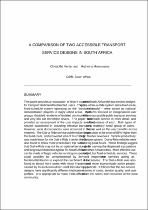 ResearchSpace
ResearchSpace
Menu-based service access and delivery pattern: Towards achieving equatable access to digital services
JavaScript is disabled for your browser. Some features of this site may not work without it.
- ResearchSpace
- →
- Research Publications/Outputs
- →
- Conference Publications
- →
- View Item
Menu-based service access and delivery pattern: Towards achieving equatable access to digital services
http://www.seekdl.org/conferences_page_papers.php?confid=180&page=25&#seekdl
http://hdl.handle.net/10204/8528
http://hdl.handle.net/10204/8528
The proliferation of mobile phones in developing countries such as South Africa has been revolutionary. This might have sufficed to address the issues of digital divide but not the digital difference. The latter means that not all these mobile phones have equal technological capabilities and this in turn has impact on the nature of the functionality that the mobile phone affords to its user. The basic capability of a mobile phone is the ability to process and display textual information. This capability is used in basic service such as Short Message Service (SMS) as well as Unstructured Supplementary Service Data (USSD). There is a need for a service access and delivery pattern that can facilitate the delivery of services using common-lowest denominator in terms of technological capabilities of mobile phones. This paper describes the conceptualization and reference implementation of a menu-based service access and delivery pattern. The reference implementation has demonstrated that through the menu-based pattern, the same content traditionally accessible only to Smartphones can be made available to low-end mobile phones as well.
Reference:
Makitla I. 2014. Menu-based service access and delivery pattern: Towards achieving equatable access to digital services. In: Second International Conference on Advances in Computing, Communication and Information Technology - CCIT 2014, University of Birmingham, UK, 16-17 November 2014, pp 5pp
Makitla, I. (2014). Menu-based service access and delivery pattern: Towards achieving equatable access to digital services. IRED. http://hdl.handle.net/10204/8528
Makitla, I. "Menu-based service access and delivery pattern: Towards achieving equatable access to digital services." (2014): http://hdl.handle.net/10204/8528
Makitla I, Menu-based service access and delivery pattern: Towards achieving equatable access to digital services; IRED; 2014. http://hdl.handle.net/10204/8528 .
Copyright: 2014 IRED
Nov 2014
Mobile phones
Digital services
Short Message Service
SMS
Unstructured Supplementary Service Data
USSD
Smartphones
Digital services
Short Message Service
SMS
Unstructured Supplementary Service Data
USSD
Smartphones
Files in this item
Related Items
This item appears in the following Collection(s)
Related items
Showing items related by title, author, creator and subject.
-
Author: Venter, C ; Mokonyama, Mathetha T Date: Jun 2001 The paper provides an evaluation of recent experience in South Africa with two service designs for transport dedicated to disabled users. The designs – a Dial-a-Ride system and a fixed-route, fixed-schedule system operating on the “service ... Read more
-
Author: Wall, K ; Bhagwan, J ; Ive, O ; Kirwan, F Date: May 2012 Studies have found that the concept of social franchising partnerships for the routine maintenance of infrastructure could alleviate and address many challenges in the management of water services. At the same time, these partnerships would ... Read more
-
Author: Chani, T ; Jembere, E ; Kabanda, SK ; Mutanga, MB ; Adigun, MO Date: Sep 2009 Service Level Agreements (SLAs) have been identified as an important tool in guaranteeing Quality of Service (QoS) in Grid service provisioning and consumption in commercial Grids. SLA templates are commonly drawn and predefined by Grid service ... Read more
Browse
-
All of ResearchSpace
-
This Collection
Legislation and compliance
General Enquiries
Tel: + 27 12 841 2911
Email: callcentre@csir.co.za
Physical Address
Meiring Naudé Road
Brummeria
Pretoria
South Africa
Postal Address
PO Box 395
Pretoria 0001
South Africa
Copyright © CSIR 2017. All Rights Reserved
Resources on this site are free to download and reuse according to associated licensing provision. Please read the terms and conditions of usage of each resource.







